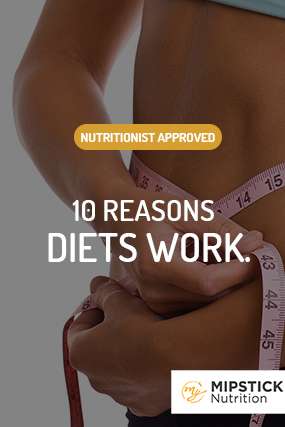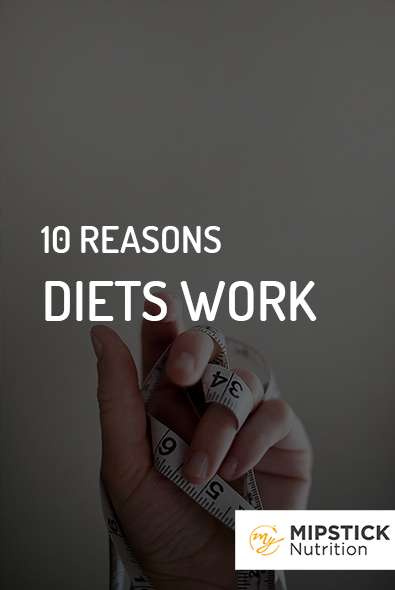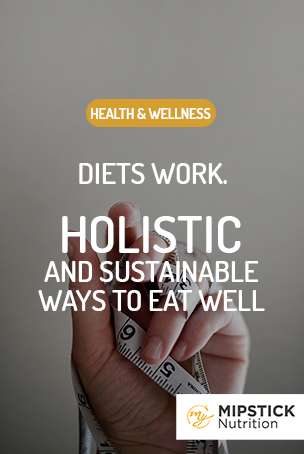August 29, 2020
You’ve probably heard that so many types of diets don’t work. Which ones do? (And ten reasons why.)
Maybe we should start by defining “diet” because frankly, I think the word has gotten a bad rap.
The word “diet” really just means “the way you eat.” In that sense, the word shouldn’t have any negative connotation to it. But it does, and that’s because typically the word is used to describe types of diets that are extreme, unhealthy, rigid, and/or unsustainable. What do I mean by “extreme”? An extreme diet is one that would call for too little food in general, too few types of nutrient-rich foods, and too few calories. If this is the case, I couldn’t agree more—those types of diets do not work!
When we don’t fuel our bodies with a variety and an adequate amount of fuel and nutrients, we become hungry, tired, and unwell. And the body will fight against that [thank goodness], rendering the diet and any associated weight loss unsustainable.
But a structured diet plan, meal plan, or training program for your nutrition (whatever you want to call it) needn’t be extreme nor unhealthy. There’s no reason you can’t plan out nutritious meals, ensure lots of variety and options for flexibility, and organize it into a calendar . . . Ah, I think we just defined a “meal plan”. . . wait, or is that a type of “diet”?? 🧐
Some nutrition experts consider a nutritious healthy meal plan a bad idea. Whaaaat?! We don’t agree.
Uh-huh, true story. Some of my colleagues do not create meal plans for their clients. They feel that telling people what to eat is counterproductive to helping them be intuitive with food choices or that it may create a dependency on a structured plan.
I couldn’t disagree more! I have SO many reasons. Here are the top 10 benefits of following a structured meal plan developed by a qualified professional showing you that it is, in fact, a good type of diet for most people (it was tough to narrow it down to just 10!). And why, if you’re looking for a meal plan, I’m your gal.
Top 10 Benefits of a Structured Meal Plan (aka the Best Type of Diet)
1. GUESSWORK REMOVED
If having a goal without a clearly laid out plan stresses you out—we get it! With a structured plan on paper, it takes the guesswork out of it. You don’t have to Google macros or which carbs are healthy and make these big decisions for yourself at a time when you may not be equipped to do so (e.g., when you haven’t yet learned what a carb is or what foods you can get plant-based protein from [we teach you all that]).
The nutrition world is a big one, with heaps of conflicting information and different stories. Leaving you to your own devices can result in overwhelm and confusion. This is one of the reasons why diets without a clear plan don’t work. Imagine how much less stressful it is to have a trusted meal plan that is right for you.
Recap: Diets with structured plans reduce stress because they reduce guesswork.
2. PROVIDES A FRAMEWORK
A structured meal plan puts your nutritional recommendations into practise. Structured meal plans show you what healthful eating actually looks like on your plate and how to get it there. You know what your health goal is and that you need to eat more veggies and protein, for example. But what are you going to eat for breakfast tomorrow? How big is a “serving”? What recipe should you use? And, do you have all the ingredients already?
All of these questions can circle your mind when you have an idea of what you need to do, but how to do it isn’t mapped out for you in actions to take every day. Types of diets without a framework don’t work.
Imagine your nutrition recommendations are like going into a gym for the first time. The staff shows you a bunch of machines and free weights that work the chest muscles. Then, they tell you to go have a chest workout without giving you guidance on how to use each machine and how many reps to take each time.
Just like a personal trainer creates a template to provide a safe and effective chest workout with the recommended number of sets and reps, as a nutritionist I do the same for you in a structured meal plan. I help you understand what to buy, how to prepare it, and when and how much to eat.
Plus, over time as you become comfortable and informed, you can begin substituting and being more flexible with your plans. That means it’s working!
Recap: Dietary frameworks work.
3. NO NEED TO TRACK OR COUNT
When you follow a Mipstick meal plan precisely, you need not worry about whether you’re achieving the daily nutritional values to support your goals or needs. Because you are! We’ve done all the math for you and carefully calculated your total daily calories and macronutrient ratios (% carbs, % fats, % protein) to best support your individual goal. So, as long as you follow the meal plan with the recommended serving sizes, you know you’ll be achieving those numbers, without the time-consuming and tedious task of tracking and counting yourself. After a little while of measuring you start to get really good at eye-balling and understanding the serving sizes that best support your body.
Recap: Ditch the types of diets that make YOU track and count, and let meal plans do that for you.
4. BUILDS YOUR STRONG FOUNDATION
We learn by doing. Although some types of diets may have you counting points (that may not translate in the real world) or simply tell you what to eat with no explanation, at Mipstick, we focus on nutrition education. Every meal plan comes with lessons built-in, teaching you the whys and hows behind the types, timing, and amounts of foods recommended.
When you understand how your body works and what fuels it best, making food choices becomes so much easier. This knowledge is what sets the stage for making healthful and goal-supporting eating a sustainable lifestyle.
Recap: Nutrition education is a key foundation for a sustainable diet that works.
5. OPTIMAL WELL-BEING
Often our cravings, increased (or decreased) hunger, low moods, poor sleep, etc. are the manifestation of physical (and even emotional) imbalances in the body. Until those are handled, it’s tough to fight the cravings or to make wise food choices consistently. The structure of a meal plan helps you get through those cravings until the balance is restored and you no longer feel the need to battle or rely solely on willpower alone.
Recap: Diets that don’t feel good—physically and emotionally—don’t work.




The word “diet” really just means “the way you eat.” In that sense, the word shouldn’t have any negative connotation to it. But it does, and that’s because typically the word is used to describe types of diets that are extreme, unhealthy, rigid, and/or unsustainable. What do I mean by “extreme”? An extreme diet is one that would call for too little food in general, too few types of nutrient-rich foods, and too few calories. If this is the case, I couldn’t agree more—those types of diets do not work!
6. PRACTISE MAKES PERFECT
Ok so we don’t really like the word perfect, but you get the drift. Being informed and making smart diet choices is a skill that is learned, just like playing the guitar, swimming, or acquiring good study habits. The more you practise, the easier the skill becomes. Research proves this. For example, “several studies have shown that people who manage to follow a low-sodium diet for several months wind up preferring lower concentrations of salt in their food,” according to Harvard Health. A structured meal plan is a type of diet that helps you practise healthy eating and portion control. These are healthy habits that can get easier over time.
Recap: Healthy habits are a skill that needs practise and can get easier over time.
7. INTENTION SUPPORTS INTUITION
“Just eat intuitively.” If I had a nickel for every time I’ve heard that in my industry . . .
If your intuition was giving you sound messages, you wouldn’t be looking for nutritional support. Right now, your intuition (or your gut) could be telling you to grab a pizza on the way home most days of the week, or pour that second glass of wine most evenings (or third glass, no judgement here 😲). Those messages or urges are coming from those imbalances mentioned above, and let me tell you—they’re tough to fight!
Here’s the thing, my wish for you is to be able to eat intuitively most of the time throughout your life. That’s the end goal for everyone, including the high-level athlete who wants to eat within a specific macronutrient range.
Until we restore balance in the body, have a foundational base of knowledge upon which to draw from to make informed choices, and practise, practise, practise—intuitive eating doesn’t just happen. That’s why we recommend structured intentional dieting whenever you feel you’ve fallen off-track. That structure is in fact what helps you to move from intentional eating to a more integrative approach. Don’t worry—following a meal plan isn’t meant to be forever!
After a while, you can slowly become more flexible with your meal plan and use it as a guide to begin effortlessly making substitutions. When you’ve got that mastered, that’s when the magic happens and your intuition starts working for you! There are three stages of dieting that start with intentional, moving to integrative, and then to intuitive.
Recap: Intentional eating leads to integrative eating and ultimately to intuitive eating. Meal plans are the type of diet that creates the intention.
8. LESS FOOD WASTE AND REDUCED GROCERY COSTS
Following a structured meal plan means that you know in advance exactly how much of this or that ingredient you will need. Grocery lists are included in Mipstick’s meal plans. The list is generated from all your meals and snacks and details exactly what and how much you need for the upcoming week. You simply buy that amount when you go grocery shopping. [Psst, having a plan in the grocery store is a life-saver too!]
Recap: Meal plans help reduce food (and money) waste.
9. IMPROVED ABILITY TO CUSTOMIZE
If you’re struggling to reach your wellness, weight loss, or performance goals, then you know something needs to change. But, what to change is based on what you’ve been doing so far. It’s more difficult to know what to change when you don’t really know exactly what you’ve been eating lately. Following a plan gives us the ability to better assess what to adjust to improve your success. So, helping you reach those goals is greatly improved when we know precisely how you’ve fueled your body.
Recap: Take your health goals to the next level by further customizing what you’ve already been doing.
10. AMPLIFIED SUCCESS
There are several benefits of following a meal plan that ultimately adds up to improved success for you! Structure, expertise, reduced stress, having a framework, learning about nutrition, being accountable to a coach or program you’ve purchased, etc.
Recap: Your healthy success is based on the type of diet that works!
CONCLUSION
Life is busy and complicated, and even the most knowledgable and conscientious eaters sometimes get off-track. With so many types of diets to choose from, how do you know which ones work? Whether you’re new to the nutrition world or a seasoned athlete or foodie, a structured meal plan can help you get [back] on track.
- Guesswork removed
- Provides a framework
- No need to track or count
- Builds your strong foundation
- Optimal well-being
- Practise makes perfect
- Intention supports intuition
- Less food waste and reduced grocery costs
- Improved ability to customize
- Amplified success
Let’s chat about finding a plan that best meets your needs & goals
REFERENCES
Harvard Health. (2017, June 5). Controlling what — and how much — we eat. Retrieved from https://www.health.harvard.edu/staying-healthy/controlling-what–and-how-much–we-eat
Kahathuduwa, C. N., Binks, M., Martin, C. K., & Dawson, J. A. (2017). Extended calorie restriction suppresses overall and specific food cravings: a systematic review and a meta-analysis. Obesity reviews : an official journal of the International Association for the Study of Obesity, 18(10), 1122–1135. https://doi.org/10.1111/obr.12566
https://www.ncbi.nlm.nih.gov/pmc/articles/PMC6226249/#!po=4.16667
What Types of Diets Work?
The entire contents of this website are based upon the opinions of Build Holistic Nutrition. Please note that Build Nutrition is not a dietitian, physician, pharmacist or other licensed healthcare professional. The information on this website is NOT intended as medical advice, nor is it intended to replace the care of a qualified health care professional. This content is not intended to diagnose or treat any diseases. Always consult with your primary care physician or licensed healthcare provider for all diagnosis and treatment of any diseases or conditions, for medications or medical advice, as well as before changing your health care regimen.
© BUILD NUTRITION 2025. ALL RIGHTS RESERVED. PRIVACY POLICY
Go ahead, creep us on social. You know you want to!

